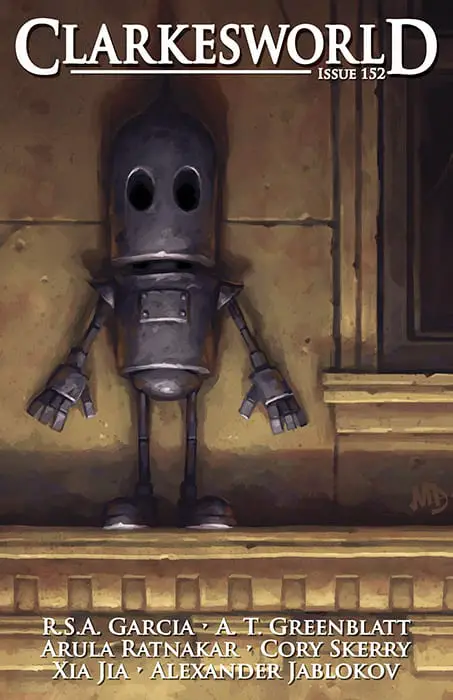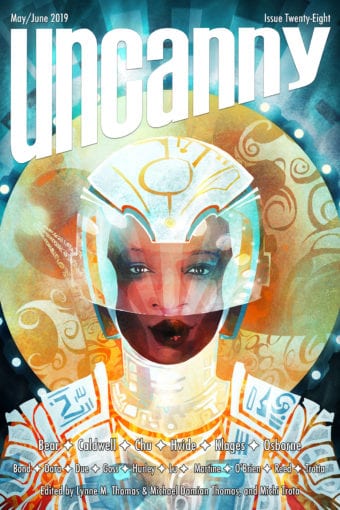I am very excited about this space for short fiction. Like Katie, I’m not a big short fiction reader, or I haven’t been so far. I am one of those people who gets motivated by obligation. If I have a responsibility, I’ll get things done one way or another; I have never read more than when I was reviewing books for the school paper in university—I had to deliver so I got it done.
So I jumped at the opportunity to participate in Short Fiction Fridays. So far, no regrets. I want to quote the reasons Katie mentions in the first installment as absolutely true: it’s a small commitment (except if you fall into a spiral of reading and you can’t stop, which is also great), it has diverse voices and it will make you a better writer. It is the last point I want to focus on, because short form is so hard for me, as a writer. Establishing a world and characters and giving them a story in a couple thousand words is no joke. Since I’ve started reading short fiction it has been, for me, an appreciation of the amazing writers that do it right.
For my first Friday I picked two stories. Both are written by women, one is a hard sci-fi and one is a subtle fantasy. One is written by a young artist, the other by a seasoned writer. On the surface, they’re wildly different stories, but I have put them together because I believe they have something powerful in common: Memory. Both stories explore how memory makes a person. This is a subject I’m fascinated by. The experiences we live shape us in ways we don’t even realize and sometimes don’t want to accept.
Science Fiction
So, without further ado, I’ll start with Arula Ratnakar’s “Insaan Hain, Farishte Nahin”, from Clarkesworld Magazine. It tells the story of a consciousness floating in space, who must deal with memories of Earth.

It’s going to be hard to talk about this story without giving away the concept, and discovering it is a big part of the reading experience, so if you care about SPOILERS, I highly advise you go read it and come back.
The author presents a futuristic world in which we didn’t stop contamination or global warming. What I find interesting is that it is both pessimistic (the air is not breathable, everything is flooded-type situation) and optimistic (and yet humans carried on living, working, having babies, even).
We start with a confused disembodied consciousness floating through space, and then meet our main focus, Meena, a scientist who is extending life by growing a second consciousness. Borne of her brain, this consciousness will receive Meena’s own memories and carry on forever. This being is called an “angel”—the meaning of the title is “Human Beings, not Angels.”
However, due to a malfunction in the sphere and an unfortunate accident on Earth, Space Meena wakes up early, and cannot communicate to Earth. Space Meena must grapple with the forced identity bestowed upon her at birth—she has no choice but to be Meena, and love Meena’s wife and children, even understanding it wasn’t really her.
IF YOU PLAY THIS MEMORY AGAIN, YOU RISK THE FOLLOWING: ADDICTION AND MEMORY DEPENDENCY, DEPRESSION, DELUSION. DO YOU WISH TO CONTINUE? SELECT: YES NO
The author delivers the essence of why I love Sci-Fi. There is a scientific curiosity, the “what if”. Ratnakar uses a clever recourse to explain the world she has created. At the same time, she’s immensely interested in the human factor; the emotion that would inevitably be attached to the science. There is a questioning of whether Meena and her team are doing the right thing in sending this other being, which they still do not comprehend, as it is the first of its kind, out to space alone, trapped in a dream-scape stock-full of memories from a life it did not really live.
The happy memories become a prison for Space Meena. The mission was to travel to another star system, but the fascination Meena had with space exploration is soon shadowed by Space Meena’s longing for the life she remembers and the people she loved.
Insaan Hain, Farishte Nahin is a beautiful story with a killer soundtrack (I do recommend you play the songs the author mentions at the start of the sequences), and a well-crafted Sci-Fi. Go read it!
Fantasy
The second story I’m putting on the spotlight is “Nice Things”, by Ellen Klages, featured in Uncanny Magazine. While the previous story explores what happens when trapped in good memories, this one deals with how bad memories work on us. It is about a woman struggling to mourn her cold, distant mother once she’s gone.

Mild SPOILERS AHEAD!
Ellen Klages is an award-winning author. She has a handle on her voice and style and it is easy to tell in the writing. Her prose flows effortless and beautiful, and has moments of divine comedy.
“Nice Things” tells the story of Phoebe Morris, who must clean out her mother’s house after her passing. Phoebe is having a complicated relationship with grief. Her mother was cold to her, a perfectionist who criticized everything from the way she walked to the way she dressed and Phoebe’s career choices. The author pulled from the combined memories of her mother’s and later her father’s death.
She felt guilty for feeling more relief than grief.
Grief gets complicated when our relationship to the person who died was fraught. Phoebe begins unearthing memories, marveling at being able to touch mother’s “nice things” without fear of reprimand. She handles her mother’s treasures and finds things kept greedily from her all her life.
Though the memories Phoebe is unearthing, the presence of Vibby Morris, the mother, is felt throughout the story. Hard as she tries, Phoebe cannot escape the scorn of the criticism, which becomes a voice in her head. Vibby is there with Phoebe as she desecrates her most treasured possessions. And then, one night, she’s there there. Or is she?
No. Mother’s dead, she thought. She almost said that out loud but knew that the word “dead” in the silent darkness would terrify her.
Phoebe, while haunted by her mother’s ghost, is set to find the best way to honor Vibby’s life and make peace with her as well. Whether she wants it to or not, Phoebe’s mother lives with her through the memories imbued with her.
“Nice Things” is a slightly eerie fantasy with a beating heart. It deals with complicated grief. When someone you loved or who you wanted to love you, dies, how do you let them go without the guilt, without the anger? The author delves into memory, and how it can haunt you—you don’t even need a ghost. Though in this case, Phoebe may have one on her hands.
Next Short Fiction Friday: Bo will bring us more good reading!

